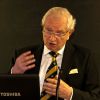PQ’s ‘medical aid in dying’ sugarcoats euthanasia, foes say
OTTAWA - Anti-euthanasia groups are pushing back against Parti Quebecois plans to bring in euthanasia under the euphemistic guise of “medical aid in dying.”
Quebec grassroots group Living with Dignity director Linda Couture said the PQ is masking its euthanasia plans behind the words medical aid in dying without defining them, she said. “Does it mean (lethally) injecting people or not?”
Couture expressed alarm at how fast the government is moving, noting the new government hopes to have a bill passed by June next year.
In early October, radio station CJAD reported Parti Quebecois junior social services minister Veronique Hivon hoped to introduce legislation soon to help people who face unbearable end-of-life suffering. Though euthanasia and assisted suicide are both illegal in Canada’s Criminal Code, and under federal jurisdiction, Hivon said health is a provincial matter. The province could also direct Crown prosecutors not to prosecute cases that fall under the guidelines for medical aid in dying, she said.
Couture said using health care and directing prosecutors in this manner is bringing in “euthanasia through the back door” while hiding behind a vague, nice-sounding phrase.
The province’s plans to move in this direction stem from recommendations of an all-party Dying with Dignity committee that held hearings across Quebec and released a report last March, Couture said. Though 60 per cent of the presenters to this committee opposed euthanasia and assisted suicide, the committee’s report recommended “medical assistance in dying” for those suffering and close to death. It ignored grassroots rejection of euthanasia and assisted suicide, Couture said.
“Everybody’s in favour of palliative care. Let’s work on what unites us not what divides us.”
Couture dared the small group of physicians who are pushing for euthanasia to put their faces on a public poster the way members of a new anti-euthanasia physicians’ organization has. The Physicians’ Alliance for Total Refusal of Euthanasia is led by the renowned Dr. Balfour Mount, considered the father of palliative care in Canada. His organization boasts 24 prominent physicians who have allowed their pictures to be published.
“We are physicians who see any law allowing doctors to intentionally end the life of their patients as contrary to the goals of medicine and the good of our patients, especially the most vulnerable and those who cannot speak for themselves,” says the group’s web site. “We intend to make known to the public the grave dangers inherent in such a law.”
At its web site, the group has a declaration and petition for both doctors and concerned citizens to circulate and send to their provincial representatives.
“To provoke death voluntarily, by lethal injection or any other method, cannot be considered under any circumstance as ‘medical care’ and is contrary to medical ethics,” the declaration reads. “It is never necessary to kill a patient in order to end his or her suffering.”
Euthanas ia Prevention Coalition director Alex Schadenberg said Quebec’s sleight of hand could bring in Belgium-style euthanasia and its lack of safeguards. A study published in the Canadian Medical Association Journal found that one-third of euthanasia deaths in Belgium were done without explicit request or consent. If medical aid in dying means doctor’s giving patients lethal injections, that is euthanasia, he said. Doctors writing prescriptions for patients knowing they will use the drugs to kill themselves is doctor-assisted suicide.
The Catholic Organization for Life and Family (COLF) said Hivon’s plans to introduce a bill are not a surprise because it was part of the Parti Quebecois’ platform. But she questioned whether the government listened to palliative care experts or the democratic results of the Dying with Dignity consultations.
“Medicine, today, can control almost any pain,” said COLF director Michele Boulva. “And, in extreme cases, palliative sedation can be used to relieve patients.”
The pro-euthanasia lobby has been trying to show Belgium-style euthanasia is working well, she said, but a group of Belgian professionals said in a manifesto signed last June that the slippery slope they had warned of 10 years ago when Belgium decriminalized euthanasia had become a reality.
“We are now very worried by suggestions that minors and mentally ill people could also be euthanized,” the manifesto says. “As we expected, once the prohibition has been lifted, we are rapidly moving towards the banalisation of euthanasia.”
“Can you even imagine teaching future doctors how to kill?” Boulva asked.
“COLF encourages Quebec Catholics and all people who have any respect for the inalienable dignity and worth of all human beings to contact their elected members of the Assemblée nationale, asking them with insistence to oppose any attempt to legalize euthanasia. This lethal practice must not enter our hospitals.”
Assisted suicide exemption creates "exception to murder"
OTTAWA - Groups opposing euthanasia have expressed alarm over a B.C. judge's recent ruling that allows Gloria Taylor, a B.C. woman dying of a degenerative nerve disorder, a constitutional exemption to an assisted suicide should her symptoms worsen in the next year.
Taylor, one of the plaintiffs in the controversial Carter case decided last June, had been granted the exemption when B.C. Supreme Court Justice Lynn Smith struck down Canada's laws against assisted suicide and euthanasia as unconstitutional on Charter grounds. Smith ruled the laws would be kept in force for a year so Parliament can react with new legislation, but allowed Taylor the exemption while the law is still in force.
In July, the federal government appealed the Carter decision, including the constitutional exemption.
On Aug. 10, B.C. Justice Jo-Ann Prowse, however, ruled removing the exemption would cause Taylor "irreparable harm" by taking away the solace and peace of mind of knowing she could obtain an assisted suicide and by removing her ability to have one before her symptoms became unbearable.
"The suggestion that denying Ms. Taylor the exemption would have caused her irreparable harm is absurd," said Catholic Organization for Life and Family (COLF) assistant director Peter Murphy. "Surely to kill or to facilitate killing is to do irreparable harm.
"Do we really want to live in country where individual judges hold the keys to life and death?" he asked. "The value of human life can never be measured by some subjective notion of its quality."
Euthanasia Prevention Coalition (EPC) executive director Alex Schadenberg questioned whether judges were "overstepping" their bounds. He pointed out the Supreme Court of Canada upheld Parliament's laws against euthanasia and assisted suicide in the 1993 Rodriguez case. Sue Rodriguez, who also had ALS or Lou Gehrig's disease, found an anonymous doctor who helped her end her life in 1994.
"It appears to me that judges are trying to make decisions that fit what they want rather than the law and judicial precedence," Schadenberg said. "They're writing their laws, their own script, and it's very concerning to me."
The Carter decision will be argued before the B.C. Court of Appeal March 4-8, 2013 and many have argued the constitutional exemption is an exception only for Taylor. But Schadenberg pointed out that others may seek exemptions under the principle of equality before the law.
"Other people who fit the criteria would have to be taken seriously," he said, noting he expected lawyers in the Ginette LeBlanc case to be argued in Quebec this December to ask for one. LeBlanc also suffers from ALS.
"Technically, the law has not changed. Euthanasia and assisted suicide are still completely illegal. Rodriquez is still upheld," Schadenberg said.
"But a judge is saying it is okay in this circumstance, the laws do not apply. It's not about Parliament, not about the Supreme Court, it's about a single judge. We're putting the power of life and death in the hands of a judge or a doctor."
Schadenberg said the federal Attorney General can appeal this latest ruling on the constitutional exemption and urged Canadians to let Justice Minister Rob Nicholson know they want him to do so.
Schadenberg said that assisted suicide is the intentional killing of a human being.
"That's homicide," he said. "We are creating an exception to murder."
Canadians and Britons are more open to physician-assisted suicide than Americans, a recent poll by Angus Reid Public Opinion has found.
Eighty per cent of Canadians and 77 per cent of the English said that doctors should be allowed to assist terminally ill, fully informed and competent patients to kill themselves. But only 56 per cent of Americans agreed.
The poll found 10 per cent of Canadians and nine per cent of Britons firmly opposed to physician-assisted suicide no matter who asks for it. Nearly one third — 29 per cent — of Americans said it should never be allowed. On the flip side, three-quarters of Canadians and Britons said physician-assisted suicide should always be allowed under specific circumstances, whereas only half of Americans thought so.
The problem with polls is that few respondents understand what’s meant by physician-assisted suicide, said Rita Marker, Patient Rights Council executive director.
“Those who are answering this poll could be viewing it as removing life support,” she said in an interview from Steubenville, Ohio. The Patient Rights Council is independent, but closely aligned with the United States Conference of Catholic Bishops.
Murky notions of palliative care and its availability fuel a fear-based response to polls on physician-assisted suicide in Canada, said Alex Schadenberg, executive director of the Euthanasia Prevention Coalition.
“Most Canadians support euthanasia or assisted suicide because they fear dying in pain or experiencing uncontrolled symptoms,” he wrote in an e-mail to The Catholic Register. “Fear is a normal human response and it should be respected.”
The poll reveals nothing new about British attitudes to physician-assisted suicide, said Charles Wookey, assistant general secretary of the Catholic Bishops’ Conference of England and Wales.
“So far as the UK is concerned, in terms of opinion surveys this doesn’t surprise me,” he said. “What we’re seeing here to a degree is an instinctive, compassionate response from a society that prizes individual autonomy very highly.”
The Angus-Reid survey found 86 per cent of Canadians, 84 per cent of Britons and 69 per cent of Americans agree with the statement that “Legalizing doctor-assisted suicide would give people who are suffering an opportunity to ease their pain.”
People who believe laws against assisted suicide protect the vulnerable from social, economic and medical pressure to commit suicide face a major education challenge, said Wookey.
“It means there’s a very, very clear job for the Church to do, particularly in secular society,” he said.
But the Church can’t do it without allies, according to Wookey.
“What’s essential in this debate in this country is for it to be conducted in secular terms,” he said. “It’s an unfortunate fact that the religious argument or arguments based on the appeal to faith tend clearly not to persuade people who do not share the faith. They invite the response, ‘Don’t impose your faith-based views on the rest of us.’ ”
British bishops have teamed up with disability rights organizations and palliative care professionals to form an alliance called Care Not Killing — a purely secular platform to engage the public policy debate.
“When people are taken through the arguments and begin to understand first of all the quality of palliative care and what palliative care can provide, and secondly what the public policy consequences are for the most vulnerable members of society of a change in the law — what it might actually lead to — then very many people do actually change their minds,” said Wookey.
Getting people educated about the issue is essential because without a full debate economic issues will enter the equation, said Marker.
“We have to recognize the fact that all health programs are trying to save money,” she said. “By trying to save money the question is, will those health programs — if you say assisted suicide is a medical treatment — will they then do the right thing or the cheap thing?”
In Canada, availability and understanding of palliative care is key, said Schadenberg. He points to a 2010 Environics poll that found 71 per cent of Canadians want governments to prioritize palliative care over euthanasia and assisted suicide. The 2011 Parliamentary Committee on Palliative and Compassionate Care report Not To Be Forgotten is a start, he said.
“The real answer is to care for the needs of Canadians who are living with terminal conditions, chronic pain or disabilities,” said Schadenberg.
Angus-Reid’s online survey polled 1,003 Americans, 2,019 Britons and 1,003 Canadians between July 4 and 5. The margin of statistical error is plus or minus 2.2 per cent for Great Britain and plus or minus 3.1 per cent for Canada and the United States.
OTTAWA- The federal government has announced it will appeal the June 15 British Columbia Supreme Court Carter decision that struck down Canada's laws against euthanasia and assisted suicide.
"After careful consideration of the legal merits," the Government of Canada will appeal the Carter decision to the British Columbia Court of Appeal and seek "a stay of all aspects of the lower court decision," said Justice Minister and Attorney General Rob Nicholson in a July 13 statement, released on a Friday afternoon shortly before the July 16 deadline for filing an appeal.
The parallels between abortion and euthanasia or assisted suicide are often cited during debates, especially by those who recall the role played by the media and the courts in first liberalizing Canada’s abortion laws and later eliminating them. But over the past few weeks we have seen a striking difference emerge.
Decades ago, almost all media outlets supported liberalization of abortion laws. In recent weeks, however, media reaction to a B.C. court decision striking down Canada’s assisted suicide laws has been anything but unanimous. Even editorials supportive of the decision have acknowledged the vulnerability of the elderly and disabled, and pointed out the potential for abuse through a more liberal law.
Opposing the court decision, the Vancouver Province said, “Allowing doctors to kill patients nearing the end of their lives, even with their consent, cheapens the sanctity of life, no matter how horrible the disease a patient is suffering from.”
Providing safeguards for medical killing is delusional
Tragedy at a Montreal psychiatric facility should stop proponents of medicalized killing dead in their tracks.
On June 16, one day after the B.C. Supreme Court struck down Canada’s laws against euthanasia and assisted suicide, someone in the high security psychiatric unit of the Centre Hospitalier Université de Montréal asphyxiated a patient. On June 21, a second patient was suffocated.
But here’s the thing: neither death was recognized as a homicide, let alone raised alarm bells, until the next day when an attempt to choke a third patient to death was foiled. A former slaughterhouse worker with a lengthy history of violent crime, who checked himself into the ward the very day the first patient was killed, was charged June 27.
OTTAWA - The Catholic Organization for Life and Family (COLF) warns Canada is veering in a "dangerous direction" towards euthanasia and assisted suicide and urges Catholics to enter the public debate on end-of-life care.
"It is impossible to remain silent following the June 15 decision by Justice Lynn Smith of the Supreme Court of British Columbia in the Carter case," said COLF director Michèle Boulva in a July 4 release. "As citizens of a country which claims to be civilized, Catholics and all people of good will have the right and duty to counter any attempt to legalize euthanasia and assisted suicide, and also to promote palliative care and true compassion."
Bishops demand appeal of B.C. euthansia ruling
OTTAWA - Canada’s bishops have expressed dismay over a B.C. Supreme Court decision June 15 to strike down Criminal Code provisions against euthanasia and assisted suicide.
“I strongly urge the government to appeal this extremely flawed and dangerous ruling,” said Vancouver Archbishop Michael Miller in a statement released the day of the decision.
The government has until July 16 to file a notice of appeal.
I cannot abide bishop bashing.
The habit in some Catholic circles of remorselessly denouncing and denigrating our prelates for perceived failures to lead, to act, to show courage, to boss the world about, sets my teeth on edge.
It is difficult to imagine a role outside the world of electoral politics that requires a broader back, a thicker skin and a finer ability to manage expectations than that of a North American Catholic bishop in 2012.
Tragic ruling in B.C.
And so it begins.
The B.C. Supreme Court has overruled Parliament to decree it lawful for a doctor to kill Gloria Taylor. Canada’s first legal physician-assisted suicide will occur when (and if) Taylor decides to proceed, despite Criminal Code statutes forbidding assisted suicide and valid concerns that Canada is on a slippery slope towards indiscriminate euthanasia.
According to the legal logic of Madam Justice Lynn Smith, a disabled person’s constitutional rights must include an equal opportunity to commit suicide. Suicide is legal in Canada but aiding suicide is not. But when illness or disability makes someone physically incapable of killing themselves, they deserve a helping hand, Smith ruled.
Obvious to all but Fr. Gravel
Quebec’s euthanasia debate must be getting horribly confusing when even a Catholic priest doesn’t know the right answer to whether the practice should be legalized.
It must be doubly so when the priest is also a former MP who knows — or should know — that euthanasia can be made legal only by amending the federal Criminal Code.
Yet here was Fr. Raymond Gravel, the one-time Bloc Quebecois MP for a Montreal-area riding, musing about whether killing the elderly, the weak and the suffering might be just what the doctor ordered for Quebec’s health care system.
Quebec bishops, COLF oppose euthanasia recommendation
OTTAWA - Quebec’s Catholic bishops and the Catholic Organization for Life and Family (COLF) have expressed opposition to a Quebec committee’s recommendation to allow euthanasia under limited circumstances.
“While we are pleased that members of the commission recommend greater access to palliative care for all people, we disagree with the recommendations to change laws to recognize physician-assisted dying as appropriate end-of-life care,” the Assembly of Catholic Bishops of Quebec said in a statement. “Changing the terms ‘assisted suicide’ and ‘euthanasia’ to ‘physician-assisted dying’ does not change reality.”
Physician-assisted suicide a ‘slippery slope’
People who believe doctors should never kill a patient even when a patient asks to die are losing the political and cultural battle against euthanasia and physician-assisted suicide. Catholics must learn to articulate their arguments in positive ways, doctors, nurses and others heard at a Canadian Catholic Bioethics Institute presentation March 28.
A December poll by Forum Research found 67 per cent of Canadians support legalizing assisted suicide. In Quebec the number rises to 81 per cent. A Quebec government commission recommended March 22 that Quebec’s Attorney General no longer prosecute cases of physician-assisted suicide.
OTTAWA - Living with Dignity (LWD), a network of anti-euthanasia groups in Quebec, has condemned the province’s Select Committee on Dying with Dignity report’s support for euthanasia as “dangerous” and a “profound act of political betrayal.”
After holding consultations across the province last year, on Mar. 22 the committee recommended the legalization of euthanasia for people experiencing constant, unbearable physical or psychological suffering.
Quebec committee ‘manipulative’ on end-of-life care
A Quebec legislative committee’s call for legalized euthanasia might be a grave danger to Canada’s health care system. Its immediate and unquestionable menace, however, is the damage it does to democracy.
For the moment, the Select Committee on Dying With Dignity’s all-party report presented March 22 to the province’s National Assembly is in parliamentary and pre-election limbo. There is reason to hope its mad demand for legalizing doctor-administered assisted suicide in Quebec by 2013 will be lost in the dust of politicians hitting the campaign trail.
















